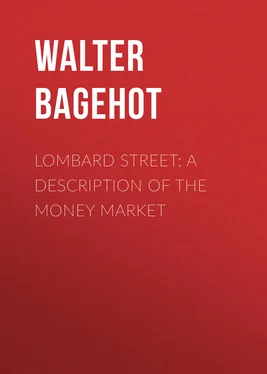Walter Bagehot - Lombard Street - A Description of the Money Market
Здесь есть возможность читать онлайн «Walter Bagehot - Lombard Street - A Description of the Money Market» — ознакомительный отрывок электронной книги совершенно бесплатно, а после прочтения отрывка купить полную версию. В некоторых случаях можно слушать аудио, скачать через торрент в формате fb2 и присутствует краткое содержание. Жанр: foreign_prose, История, foreign_edu, foreign_antique, на английском языке. Описание произведения, (предисловие) а так же отзывы посетителей доступны на портале библиотеки ЛибКат.
- Название:Lombard Street: A Description of the Money Market
- Автор:
- Жанр:
- Год:неизвестен
- ISBN:нет данных
- Рейтинг книги:4 / 5. Голосов: 1
-
Избранное:Добавить в избранное
- Отзывы:
-
Ваша оценка:
- 80
- 1
- 2
- 3
- 4
- 5
Lombard Street: A Description of the Money Market: краткое содержание, описание и аннотация
Предлагаем к чтению аннотацию, описание, краткое содержание или предисловие (зависит от того, что написал сам автор книги «Lombard Street: A Description of the Money Market»). Если вы не нашли необходимую информацию о книге — напишите в комментариях, мы постараемся отыскать её.
Lombard Street: A Description of the Money Market — читать онлайн ознакомительный отрывок
Ниже представлен текст книги, разбитый по страницам. Система сохранения места последней прочитанной страницы, позволяет с удобством читать онлайн бесплатно книгу «Lombard Street: A Description of the Money Market», без необходимости каждый раз заново искать на чём Вы остановились. Поставьте закладку, и сможете в любой момент перейти на страницу, на которой закончили чтение.
Интервал:
Закладка:
'In order to remedy the inconvenience to which this disadvantageous exchange must have subjected their merchants, such small states, when they began to attend to the interest of trade, have frequently enacted, that foreign bills of exchange of a certain value should be paid, not in common currency, but by an order upon, or by a transfer in, the books of a certain bank, established upon the credit, and under the protection of the state, this bank being always obliged to pay, in good and true money, exactly according to the standard of the state. The banks of Venice, Genoa, Amsterdam, Hamburgh and Nuremburg, seem to have been all originally established with this view, though some of them may have afterwards been made subservient to other purposes. The money of such banks, being better than the common currency of the country, necessarily bore an agio, which was greater or smaller, according as the currency was supposed to be more or less degraded below the standard of the state. The agio of the bank of Hamburgh, for example, which is said to be commonly about fourteen per cent, is the supposed difference between the good standard money of the state, and the clipt, worn, and diminished currency poured into it from all the neighbouring states.
'Before 1609 the great quantity of clipt and worn foreign coin, which the extensive trade of Amsterdam brought from all parts of Europe, reduced the value of its currency about 9 per cent below that of good money fresh from the mint. Such money no sooner appeared than it was melted down or carried away, as it always is in such circumstances. The merchants, with plenty of currency, could not always find a sufficient quantity of good money to pay their bills of exchange; and the value of those bills, in spite of several regulations which were made to prevent it, became in a great measure uncertain.
'In order to remedy these inconveniences, a bank was established in 1609 under the guarantee of the City. This bank received both foreign coin, and the light and worn coin of the country at its real intrinsic value in the good standard money of the country, deducting only so much as was necessary for defraying the expense of coinage, and the other necessary expense of management. For the value which remained, after this small deduction was made, it gave a credit in its books. This credit was called bank money, which, as it represented money exactly according to the standard of the mint, was always of the same real value, and intrinsically worth more than current money. It was at the same time enacted, that all bills drawn upon or negotiated at Amsterdam of the value of six hundred guilders and upwards should be paid in bank money, which at once took away all uncertainty in the value of those bills. Every merchant, in consequence of this regulation, was obliged to keep an account with the bank in order to pay his foreign bills of exchange, which necessarily occasioned a certain demand for bank money.'
Again, a most important function of early banks is one which the present banks retain, though it is subsidiary to their main use; viz. the function of remitting money. A man brings money to the bank to meet a payment which he desires to make at a great distance, and the bank, having a connection with other banks, sends it where it is wanted. As soon as bills of exchange are given upon a large scale, this remittance is a very pressing requirement. Such bills must be made payable at a place convenient to the seller of the goods in payment of which they are given, perhaps at the great town where his warehouse is. But this may be very far from the retail shop of the buyer who bought those goods to sell them again in the country. For these, and a multitude of purposes, the instant and regular remittance of money is an early necessity of growing trade; and that remittance it was a first object of early banks to accomplish.
These are all uses other than those of deposit banking which banks supplied that afterwards became in our English sense deposit banks. By supplying these uses, they gained the credit that afterwards enabled them to gain a living as deposit banks. Being trusted for one purpose, they came to be trusted for a purpose quite different, ultimately far more important, though at first less keenly pressing. But these wants only affect a few persons, and therefore bring the bank under the notice of a few only. The real introductory function which deposit banks at first perform is much more popular, and it is only when they can perform this more popular kind of business that deposit banking ever spreads quickly and extensively. This function is the supply of the paper circulation to the country, and it will be observed that I am not about to overstep my limits and discuss this as a question of currency. In what form the best paper currency can be supplied to a country is a question of economical theory with which I do not meddle here. I am only narrating unquestionable history, not dealing with an argument where every step is disputed. And part of this certain history is that the best way to diffuse banking in a community is to allow the banker to issue bank-notes of small amount that can supersede the metal currency. This amounts to a subsidy to each banker to enable him to keep open a bank till depositors choose to come to it. The country where deposit banking is most diffused is Scotland, and there the original profits were entirely derived from the circulation. The note issue is now a most trifling part of the liabilities of the Scotch banks, but it was once their mainstay and source of profit. A curious book, lately published, has enabled us to follow the course of this in detail. The Bank of Dundee, now amalgamated with the Royal Bank of Scotland, was founded in 1763, and had become before its amalgamation, eight or nine years since, a bank of considerable deposits. But for twenty-five years from its foundation it had no deposits at all. It subsisted mostly on its note issue, and a little on its remittance business. Only in 1792, after nearly thirty years, it began to gain deposits, but from that time they augmented very rapidly. The banking history of England has been the same, though we have no country bank accounts in detail which go back so far. But probably up to 1830 in England, or thereabouts, the main profit of banks was derived from the circulation, and for many years after that the deposits were treated as very minor matters, and the whole of so-called banking discussion turned on questions of circulation. We are still living in the debris of that controversy, for, as I have so often said, people can hardly think of the structure of Lombard Street, except with reference to the paper currency and to the Act of 1844, which regulates it now. The French are still in the same epoch of the subject. The great enquete of 1865 is almost wholly taken up with currency matters, and mere banking is treated as subordinate. And the accounts of the Bank of France show why. The last weekly statement before the German war showed that the circulation of the Bank of France was as much as 59,244,000 L., and that the private deposits were only 17,127,000 L. Now the private deposits are about the same, and the circulation is 112,000,000 L. So difficult is it in even a great country like France for the deposit system of banking to take root, and establish itself with the strength and vigour that it has in England.
The experience of Germany is the same. The accounts preceding the war in North Germany showed the circulation of the issuing banks to be 39,875,000 L., and the deposits to be 6,472,000 L. while the corresponding figures at the present moment are—circulation, 60,000,000 L. and deposits 8,000,000 L. It would be idle to multiply Instances.
The reason why the use of bank paper commonly precedes the habit of making deposits in banks is very plain. It is a far easier habit to establish. In the issue of notes the banker, the person to be most benefited, can do something. He can pay away his own 'promises' in loans, in wages, or in payment of debts. But in the getting of deposits he is passive. His issues depend on himself; his deposits on the favour of others. And to the public the change is far easier too. To collect a great mass of deposits with the same banker, a great number of persons must agree to do something. But to establish a note circulation, a large number of persons need only do nothing. They receive the banker's notes in the common course of their business, and they have only not to take those notes to the banker for payment. If the public refrain from taking trouble, a paper circulation is immediately in existence. A paper circulation is begun by the banker, and requires no effort on the part of the public; on the contrary, it needs an effort of the public to be rid of notes once issued; but deposit banking cannot be begun by the banker, and requires a spontaneous and consistent effort in the community. And therefore paper issue is the natural prelude to deposit banking.
Читать дальшеИнтервал:
Закладка:
Похожие книги на «Lombard Street: A Description of the Money Market»
Представляем Вашему вниманию похожие книги на «Lombard Street: A Description of the Money Market» списком для выбора. Мы отобрали схожую по названию и смыслу литературу в надежде предоставить читателям больше вариантов отыскать новые, интересные, ещё непрочитанные произведения.
Обсуждение, отзывы о книге «Lombard Street: A Description of the Money Market» и просто собственные мнения читателей. Оставьте ваши комментарии, напишите, что Вы думаете о произведении, его смысле или главных героях. Укажите что конкретно понравилось, а что нет, и почему Вы так считаете.












